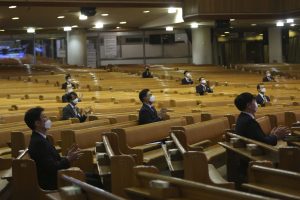Ugh! The Movement Control Order (MCO) has been extended for another two weeks till 28 April. Even for an introvert like me it’s getting a bit too much of time alone! But that’s not the point of this blogpost.
Even when the MCO is finally lifted there is a real possibility that Putrajaya may ban large gatherings for the rest of 2020.
 What constitutes a large gathering? According to a report in TheEdgeMarkets it is anything above 250 people (13 March 2020). However, according to theStar online it is anything above 50 people (4 April 2020). On top of this the authorities may still require people to keep a distance of at least one metre (maybe even two metres) from one another. If this is implemented the capacity of a church’s worship hall will immediately be reduced to hold at most one third of the usual crowd at any one time.
What constitutes a large gathering? According to a report in TheEdgeMarkets it is anything above 250 people (13 March 2020). However, according to theStar online it is anything above 50 people (4 April 2020). On top of this the authorities may still require people to keep a distance of at least one metre (maybe even two metres) from one another. If this is implemented the capacity of a church’s worship hall will immediately be reduced to hold at most one third of the usual crowd at any one time.
I believe churches will want to abide by the directives, and also to keep their members safe. What can we do to adjust to the situation, and yet thrive in it? Here are some suggestions for the worship service.1
- Have multiple services.
- Provide overflow rooms with close-circuit TV or live-streaming facilities.
- Live stream the service so that members2 can join the service at home. Those who prefer to play it safe can stay home and join the service online. Perhaps, it ought to be made mandatory for the less healthy and elderly.
- Members to take turns to attend a live worship. One suggestion is for people to pre-register until the quota is filled, with preference given to those who do not have the technical resources to join the live-stream.
An alternative is to schedule attendance at the live worship by cell groups. What about those who are not in a cell? It then depends on a church’s philosophy of ministry. Either some places are set aside for those who are not in a cell, or they be asked to join a cell as a pre-step to attend a live worship.
The implications of “no large gatherings” is going to be huge on the church. I’ve not begun to address two other important groups, the youth and the children (maybe in another post). And also about outreach—how will we be doing it in the day of social distancing? Here’s the bottom line: I don’t think we can do church in the same way as we did pre-MCO.
 Clearly, church is not just about the worship service. Church ultimately is about relationships (vertical and horizontal), discipleship (or discipling) and reaching out to the world (to win the spiritually lost and to impact our world). If worship services are cut shorter to cater for multiple services and the live-stream “audience”, coupled with social distancing and quick exits from the church building, the worship services are not going to cut it as far as the above mentioned objectives are concerned.
Clearly, church is not just about the worship service. Church ultimately is about relationships (vertical and horizontal), discipleship (or discipling) and reaching out to the world (to win the spiritually lost and to impact our world). If worship services are cut shorter to cater for multiple services and the live-stream “audience”, coupled with social distancing and quick exits from the church building, the worship services are not going to cut it as far as the above mentioned objectives are concerned.
A couple of pastors shared with me that this is where the small group ministry is critically important. Small groups can fulfil all the three objectives. We used to think that the establishment of cells was in preparation for persecution. Little did we know that they would also be critical for a time like this.
I want, however, to add that these small groups must be intentional about discipling, if the church wants to thrive, and not to simply ride out this period of uncertainty. A critical factor rests on a very important person—the small group leader. The above-mentioned pastors said that helping their small group leaders to recalibrate and to empower them for their role will be their primary focus. I’m sure one of the areas of training will be about making effective use of online facilities to connect and disciple their members.
So, during the ban on large gatherings there are at least two things your church should do. One, restructure your worship service and make use of the online platform. And two, recalibrate and strengthen your small group ministry with the focus on caring, discipling and reaching out to others.
1 These include suggestions from the pastors who responded to my query.
2 By “members” I do not mean registered members but all who worship regularly at your church.
Lim Soon Hock Empowering Churches